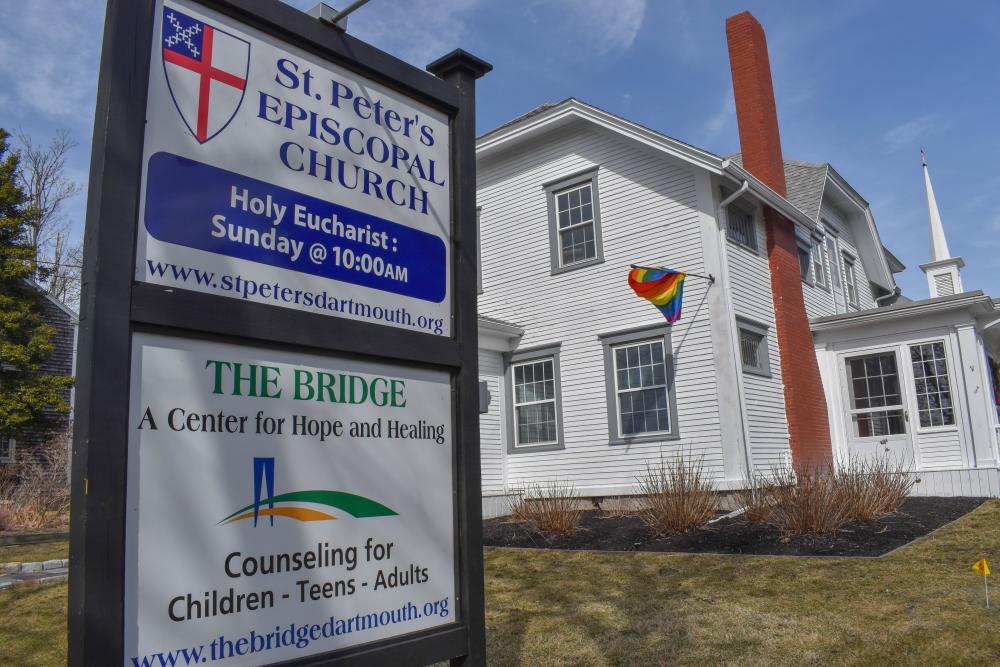St. Peter's nonprofit helps bring 'hope and healing' to 'underserved' part of state
When Rev. Scott Ciosek started “The Bridge: A Center for Hope and Healing, ”a nonprofit based out of St. Peter’s Epsicopal Church in 2015, he hoped to expand mental health into a region he found had “less access” compared to other areas of the commonwealth.
“So many people in this community are in need of support,” he said. “Nobody should ever have to walk that life journey alone — hope and healing are always possible.”
According to Ciosek, someone called recently for service noting that at other centers in the area, there was a wait list of six months.
“And that is just to get in to get a therapy appointment,” he said.
The Bridge offers grief support groups, weekly meditation, and mental health counseling.
In light of this work, the center was recognized by Massachusetts General Hospital this past January for its work in the region, one the hospital said is “underserved.”
“It feels pretty incredible,” Ciosek said, adding that the bulk of the credit goes to his staff in managing this surge in clients.“They’re the ones on the front lines serving the behavioral health needs of the community.”
In the wake of the Covid-19 pandemic, Ciosek said that the need for help is more evident than ever. Since 2020, he and his staff estimate the number of clients has quadrupled.
In order to deal with this quadrupling of clients, counselor Carla Moe said modern technology was a big help — especially the ability to conduct sessions over video chat.
“It’s been very helpful,” Moe said. “It opens up options for help.”
Gina Santos, a licensed mental health counselor at the center, agreed.
“Can you imagine if this [pandemic] happened in 1950?” she said. “The world would really stop.”
With pandemic restrictions loosened, Moe and Santos said it's nice to have closer collaborations with clients — though telehealth is still an option for those who prefer it.
Sessions work best when it’s a collaboration with clients. Santos, who has a degree in art therapy, likes to bring some creativity when providing counseling.
One activity she likes to do with clients dealing with anxiety is rip apart pieces of paper and make those shreds into an art project that shows living with disorder like any is like any other part of their lives.
“It shows something beautiful and positive can come out of it,” she said. “It’s a good way to break the ice with someone.”
Another project Santos did to give a little self-love to a client was making a paper flower showing things the client wants people to see on open petals, with the option of closing it so people wouldn't have to know. According to Santos, those petals have remained open.
“It’s always inviting to people,” she said with a smile.
Another reason for the uptick in clients is due to high demand from children and adolescents, demographics the center is really hoping to bolster services for.
The pandemic is a big factor in this surge, Santos said.
According to a 2021 survey from the state’s Department of Health, almost half of all youth in Massachusetts (48%) reported feeling sad or hopeless almost every day for two weeks or more in a row that they stopped doing some usual activities.
Members of the LGBTQ+ community were especially impacted by the pandemic, with 78% of transgender, 83% of nonbinary, and 84% of queer youth reporting feelings of depression. Of those surveyed, 61% of queer youth have had more than three PTSD reactions, 55% of non-binary youth have had more than three PTSD reactions, and 53% of youth of transgender experience have had more than three PTSD reactions during the pandemic.
Giving kids a safe space to talk about their feelings and experiences, Santos said, is very important in ensuring proper development moving forward.
“If you can’t process things as a child, it really messes yourself as an adult,” Santos said.
To bolster these services, Ciosek said the center is currently working with Dartmouth Youth Advocate Deloris Joseph, who is also a member of the center’s board of directors, on finding ways to provide services to the town’s schools.
Plans are to either meet in the schools after class or to have a space at Town Hall.
The center was awarded grants from the Carney Foundation and South Coast Community foundation to further assist kids across the region.
Ciosek said the Bridge is also working on collaborating with UMass Dartmouth’s nursing school in order to work as interns with one-on-one therapy as they complete their degrees to become psych nurse practitioners.
With this help, Santos said she is optimistic that people on the South Coast can have even more access to mental health services.
“We need more therapists, we need more people,” she said.
For more information about The Bridge, or to schedule an appointment, call (508) 997-0903. The Bridge offers free support groups, and most major insurance plans are accepted for one-on-one therapy programs.












